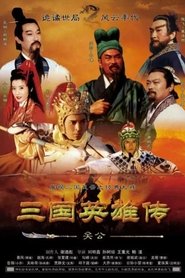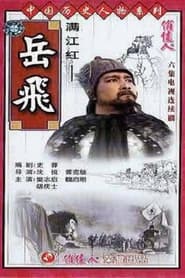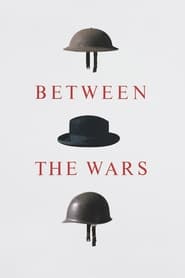Popular War Politics TV Series - Page 73
-
Ertugrul Ghazi Urdu
2017
Ertugrul Ghazi Urdu
2017
The heroic story of Ertugrul Ghazi, the father of Osman (Uthman) who founded the Ottoman Empire. -
The Nation
2007
-
Sacred Sites
2016
Sacred Sites
2016
This docuseries uses scientific breakthroughs and archaeological research to bring new perspectives to some of the most remarkable, but mysterious, religious locations. Each episode focuses on a site, exploring fundamental questions about the landmarks and the people who constructed them. Exploring the sites allows the show to provide insight into the ancient civilizations and how their practices and struggles are reflected in the shrines and temples they constructed. -
Invisible Heroes
2019
Invisible Heroes
2019
star 7.4Invisible Heroes tells the heroic tale of young Finnish diplomats in Chile during 1973’s infamous military coup. Finnish diplomats Tapani Brotherus and Ilkka Jaamala along with Tapani’s wife Lysa Brotherus helped over 2000 left-wing Chileans escape the military junta’s persecution. The Finns acted without official authorization while Swedish ambassador Harald Edelstam was the most visible defendant of human rights with the backing of Sweden’s Prime Minister, Olof Palme. -
Los desastres de la guerra
1983
The painter Francisco de Goya is witness to the disasters and horrors caused by the bloody resistance of the Spanish people to the French occupation during the Napoleonic wars. -
三国英雄传之关公
1996
三国英雄传之关公
1996
-
清明上河图
2004
清明上河图
2004
-
WWII in Color: Road to Victory
2021
star 7.8Gripping historical footage and expert commentary give detailed insights into the leading figures and decisive turning points of World War II. -
Tutur Tinular
1997
Tutur Tinular
1997
star 10Tutur Tinular is an Indonesian historical-drama TV series, produced by Genta Buana Pitaloka (now Genta Buana Paramita. It was first aired on ANTV in October 25,1997 (Season 1) and Indosiar in 1999 (Season 2). -
满江红-岳飞
1992
满江红-岳飞
1992
-
The Governor
1977
-
Between the Wars
1978
Between the Wars
1978
star 10This classic series follows the events that sparked the greatest conflict of the century, capturing the drama, the excitement and the ideological juxtapositions of these crucial years. Former CBS News correspondent and commentator Eric Sevareid, one of the world's most respected figures in journalism, presents this extraordinary series featuring stunning original newsreels, soundtracks, and rare archival footage. -
寇准破案传奇
2000
寇准破案传奇
2000
-
The American Revolution
2014
star 8.3Everyone knows the story of Paul Revere and his famous midnight ride to warn colonial forces of the British approach. But history books don't tell of the man who sent Revere on his mission: Joseph Warren, America's least remembered founding father. Uncover the forgotten history of Warren and stories of other unsung heroes in our fight for independence. -
Frederick Forsyth's Icon
2005
During the 1999 Russian Presidential elections, the two leading candidates are Igor Komarov, a former Colonel of the KGB, and Nikolai Nikolayev, a retired General of the Russian Army. When a car bomb explodes outside one of Komarov's pharmaceutical companies, and a virus is stolen from inside, an investigation by the FSB ensues headed by FSB agents Sonia Astrova and Andrei Kasanov. Their investigation is obstructed by the Director of the FSB, Anatoly Grishin. -
Archiv des Todes
1980
Archiv des Todes
1980
star 8.5Archiv des Todes is a 1980 13-part television series German war television film series set during World War II. -
敌后英雄
2012
敌后英雄
2012
-
Attack on Leningrad
2007
Attack on Leningrad
2007
star 5.5When in 1941 Nazi Germany invaded the Soviet Union, their troops quickly besieged Leningrad. Foreign journalists are evacuated but one of them, Kate Davies, is presumed dead and misses the plane. Alone in the city she is helped by Nina Tsvetnova a young and idealist police officer and together they will fight for their own survival and the survival of the people in the besieged Leningrad. -
WW2 Treasure Hunters
2017
WW2 Treasure Hunters
2017
star 7.5WW2 Treasure Hunters pairs Britain's foremost amateur WW2 detectorist with Madness frontman Suggs, as they uncover historical finds from across the UK. Using state-of-the-art technology, original WW2 archives and maps, the pair work together to identify the best places to dig at forgotten sites, including former military bases, airfields, POW camps and barracks. Once located, they then go on to perform extensive digs to excavate the relics. As the artefacts are unearthed, the presenters turn detective, revealing the stories and people behind the finds. They meet with survivors, experts and historians to understand what happened at each of the locations.
 Netflix
Netflix
 Amazon Prime Video
Amazon Prime Video
 Apple iTunes
Apple iTunes
 Apple TV Plus
Apple TV Plus
 Disney Plus
Disney Plus
 Google Play Movies
Google Play Movies
 Paramount Plus
Paramount Plus
 Hulu
Hulu
 HBO Max
HBO Max
 YouTube
YouTube
 fuboTV
fuboTV
 Peacock
Peacock
 Peacock Premium
Peacock Premium
 Amazon Video
Amazon Video
 The Roku Channel
The Roku Channel
 AMC+
AMC+
 Kocowa
Kocowa
 Hoopla
Hoopla
 The CW
The CW
 Vudu
Vudu
 Starz
Starz
 Showtime
Showtime
 PBS
PBS
 Pantaflix
Pantaflix
 FXNow
FXNow
 Tubi TV
Tubi TV
 Kanopy
Kanopy
 Comedy Central
Comedy Central
 Crunchyroll
Crunchyroll
 Microsoft Store
Microsoft Store
 Redbox
Redbox
 Sun Nxt
Sun Nxt
 ABC
ABC
 DIRECTV
DIRECTV
 Crackle
Crackle
 Fandor
Fandor
 Plex
Plex

















